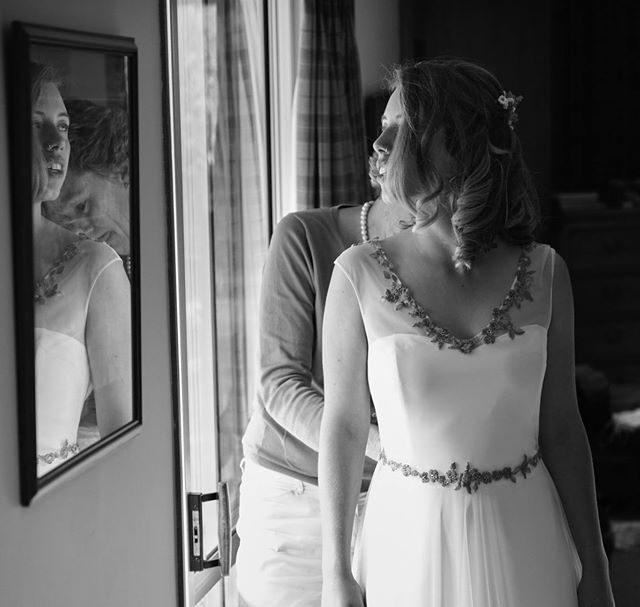by Lucinda Staniland

Here I am on my wedding day: afraid, joyous and deeply ambivalent.
I’ve been using the word ‘ambivalent’ a lot recently. I like the sound of it. I like that it acknowledges complexity – of myself and of the world. I like that it doesn’t lock me, or anyone else, into a box.
Take getting married for example.
My partner and I were married in January 2017, and for me, it was a classic experience of ambivalence. In fact, it was during the preparations for our wedding that the word ‘ambivalent’ became a core part of my vocabulary.
I spontaneously proposed to my partner in February 2016, and by April we were in full wedding planning mode.
I hated it.
I hated dealing with logistics; I hated having the world’s assumptions about weddings, and particularly about brides, shoved in my face; I hated that everyone in my life had an opinion about how things should be done and that I was suddenly expected to care about napkins, floral decorations and personalised wedding favours.
And yet I was also totally committed to getting married.
I wanted to do it, and I didn’t regret asking Jack to marry me. In the months before I had proposed, marriage had suddenly started making sense to me; it felt true and right and good. Somehow I intuitively knew that it was something we needed to do.
It was at this moment that I discovered the concept of ambivalence.
Previously I had always associated it with apathy and indifference, but ambivalence is actually something much more dynamic: the simultaneous opposing forces acting within a person.
I was certainly feeling the tug of opposing forces in the midst of all this wedding planning, and I was relieved to find a word that described what I was feeling. I wanted this wedding, and I didn’t want this wedding. I wanted out, and I wanted in. I was deeply ambivalent; ambivalent to the bone.
“I’m so confused,” I would say, “Why am I always so confused?”
These days I find that I use ambivalent where I used to say confused.
I’m not sure if I’ve actually become less confused, or if I’ve just found better ways to describe what I’m experiencing, but whatever the shift has been I’m grateful for it: confused never felt like a particularly empowering word, it always made me feel murky and muddled, but ambivalence has an edge of awareness to it which I find much more useful.
When I say, “I’m ambivalent,” it means that I have a growing awareness of the conflict and tension going on within me, even if I can’t exactly identify the warring parties.
The situation might still be painful, but there’s the possibility of working with the raw material of my suffering and transmuting it into something else.
Ambivalence.
It’s a new word – coined only in 1910 by a Swiss psychologist – but it seems to me that it’s an old concept and that what it describes is essentially the natural state of human beings.
Humans are a complex creation of neurons and hormones, feelings and thoughts, muscles and fascia. We live in a world that is unpredictable and sometimes cruel. There are no guarantees. How often are human beings in total harmony with themselves? It’s certainly not something that I experience on a daily basis.
Being able to acknowledge our ambivalence is powerful. It’s our chance to say, “Actually, it’s not that simple.”
It’s our chance to get curious about our suffering and tension and to start to look at what’s really driving us. It’s our chance to acknowledge the messy complexity that is inherent to the lives of human beings and to revel and sorrow in it.
These words from poet David Whyte struck me as particularly true and poignant:
So one of the astonishing qualities of being human is the measure of our reluctance to be here, actually. And I think one of the great necessities of self knowledge is understanding and even tasting the single-malt essence of your own reluctance to be here.
All the ways you don’t want to have the conversation, all the ways you don’t want to be in the marriage, you don’t want to be a parent, you don’t want to be visible in a leadership position, you don’t want to be doing this work. And this is not to give it away. This is just to understand what lies between you and a sense of freedom in it.
What would it look like to explore our reluctance to be here? What kind of conversations might it open up?
Now more than ever, the world needs dialogue. We need to build pathways of genuine, authentic communication and connection between the different facets of our societies and communities.
Because if we could acknowledge together that it’s difficult and complex to be human, and that it’s difficult and complex for humans to live alongside each other, how might that change the conversations that we really need to have?
So many of these conversations have become increasingly polarised and hate-filled, with each side unable to understand where the other is coming from. I’m thinking here about the tough stuff: abortion, incarceration, rape, poverty, racism and war. Could a concept of ambivalence open up these painful, emotionally fuelled topics?
As for me, three months on from our wedding and I’m already looking back at it with fondness. It was a wonderful day— stressful, terrifying, overwhelming—and… wonderful.
Two days before the wedding I started to experience what felt like a constant panic attack: my heart racing, my stomach in a painful knot, my head buzzing, and an intense sensation of cortisol whizzing unremittingly around my body.
I wasn’t sleeping well, I wasn’t digesting my food properly, and I had frequent headaches. I was in no mood to socialise with the guests who had arrived early. In fact, every time someone we knew ‘popped in’ for a visit, my anxiety would skyrocket.
Ten minutes before we had to leave for the ceremony my mother and sister threatened to forcibly restrain me (lovingly, they claimed) if I tried to wash off the thick layer of foundation that my makeup artist had applied, I thought, with a rather heavy hand.
Five minutes before we left for the ceremony the sun went behind a cloud, and I started shivering uncontrollably.
And it was perfect. The entire wedding, every part of it, was perfect.
I was totally unprepared for the amount of love and good feeling that was directed at us, and by the strength of the powerful, insistent connection between Jack and I. This public, yet very intimate wedding ceremony felt like a truly meaningful threshold to cross; one that tied us even closer together, and sent us out into the unknown hand-in-hand.
I’m learning to love ambivalence.
It certainly saved my wedding.
At so many points in the process, it would have been easy for me to dissolve into a pit of despair, and decide to cancel the wedding, without ever examining what was really going on.
But because I had the word ‘ambivalence’ in my arsenal I was able to more accurately describe how I was feeling. Instead of saying, “I hate this and I don’t want to do it,” I could say, “I’m feeling deeply ambivalent about this wedding,” and I could give myself and others the space to sit with, and shine a light on, the conflicting forces I was experiencing.
Ambivalence. Maybe it’s the word that could save our society too.

Great post Lucida. Interesting to read this blog post.
I just like the helpful information you provide in your articles. I will bookmark your blog and take a look at once more here regularly.
I am somewhat certain I’ll be informed plenty of new stuff right here! Good luck for the following!